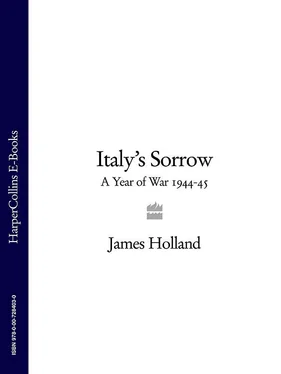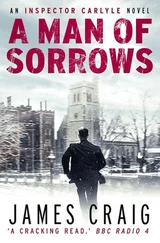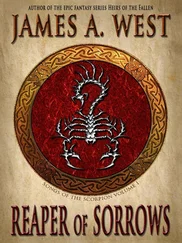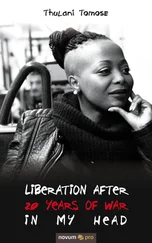Passing the bottom of the Via Rasella, Carla had continued up the Via del Traforo and was now waiting by the offices of Il Messaggero newspaper. She spotted Pasquale Balsamo, another partisan, standing by a news-stand. Perhaps he could sense her nerves in the taut expression in her face, because as he looked across he gave her a reassuring wink.
At least they were both now in position. It was Pasquale’s job to give Carla the signal to let her know that the German troops were on their way. She would then turn right onto the Via del Tritone, a main thoroughfare that ran roughly parallel to the Via Rasella, and after 300 yards, turn right again onto another main street, the Via delle Quattro Fontane, until she reached the top end of Via Rasella. There she would wait for Paolo with the raincoat – the overcoat that was to cover up his dustman’s uniform as they attempted to make good their escape.
Standing by Il Messaggero , Carla paused to look at the newspaper pinned in a display case outside the entrance, keeping half an eye out for Pasquale’s reflection in the glass in front of her. Nearby, far too close for comfort, were two men – very obviously plainclothes policemen. The newspaper was full of news about the eruption of Mount Vesuvius five days earlier, but as her eyes flickered over the newsprint she was conscious that too much time was going by. Why hadn’t Pasquale given her the signal? And where were the SS troops? The whole operation had been built around the Germans’ unvarying Teutonic routine: every day, without fail, the same column of around 160 men of the 11th Company of the 3rd Battalion of the SS Police Regiment Bozen would march through the centre of the city on their way back to their barracks after a morning’s training at a shooting range near the Roman bridge, Ponte Milvio. As they marched, singing ‘ Hupf, Mein Mädel! ’ – ‘Skip, My Lassie’ – they would pass up the length of the comparatively narrow and enclosed Via Rasella.
A quarter past two came and went. Then 2.20 p.m., 2.30 p.m., 2.45 p.m. and still no sign of the troops. The plainclothes policemen approached her. As they did so Carla gripped the pistol in her pocket. ‘Excuse me, signorina ,’ one of them said to her. ‘Are you waiting for someone?’ For a split second she froze, then said, yes, she was waiting for her fiancé, who, she explained, worked at the Palazzo Barberini. She then began talking to them about the eruption of Vesuvius and the potential disaster this might cause for Naples. This seemed to work. She felt calmer suddenly, so that when one of them asked her sharply why she was carrying a raincoat on such a hot day, she told them that it was her fiancé’s and that she had had a stain removed from it and was going to give it back to him.
She then saw Pasquale start towards her. What was the time? She asked the policemen: 2.47 p.m. one of them told her. In that case, she said, it was time for her to go. Hurrying away from them, she passed Pasquale who muttered something she could not make out, but knowing she could not look back and believing Pasquale’s message was the signal for her to move, she turned into the Via del Tritone and then down Quattro Fontane to take up her position for the attack.
At the top of Via Rasella, Carla saw Paolo sweeping the road half way down the street, the dustcart in the middle of the road. She had been expecting to see the SS column marching into the bottom of the street but there was still no sign. She could not think what had gone wrong. One of only twelve partisans from GAP Central, she was well aware that their chances of pulling off such an attack and then successfully escaping were not high. Life in Rome was becoming increasingly dangerous with not only the Gestapo closing in on them but also the Neo-Fascist secret police. There was also a particularly vicious gang of Fascist vigilantes, which had been set up soon after the German occupation the previous autumn as a counter-partisan ‘Special Police Unit’. Known as the Koch Gang after its leader, Pietro Koch, the band was already a byword for ruthlessness and brutality, known for the particular vindictiveness with which they tortured those who fell into their grasp.
The growing dangers had done little to deter the Gappists, but all of the partisans in GAP Central, Carla included, were very aware that their planned attack in the Via Rasella was the most daring strike attempted yet. The night before, lying next to Paolo in their hide-out, she had needed to remind herself why she was taking part in such an action. In the silence and dark, she had thought of how unjust the war was, and of the destruction and devastation it had caused to her country. She thought of her compatriots who had already been shot and tortured and of all those who had been deported and who had not been heard of since; and she thought of all those friends of hers who had already died in the fighting in Russia, in Greece, in Yugoslavia; she remembered her cousin, Amleto, killed fighting the Allies at El Alamein. But while such thoughts had helped stiffen her resolve, her fears remained. If they were caught, she knew they would be killed.
At the top of the Via Rasella, in the garden of the Palazzo Barberini, Carla spotted some children playing football. Imagining the horrors of the children being caught in the bomb blast she walked over and shouted at them, ‘You can’t play football in this garden. Go home and do your homework!’ Recognising something in her tone, they all immediately scurried off.
The minutes ticked by. Still nothing. What could have gone wrong? As she waited by the gates of the Palazzo Barberini the same two plainclothes policemen approached her again. It was now just after 3.30 p. m., more than an hour and a half after the bomb was supposed to have gone off. ‘You still here?’ they asked her. Her fiancé was at the Officer’s Club in the Palazzo, she told them, desperately hoping they would not see Paolo and his rubbish cart a hundred yards up ahead. She couldn’t go in there, she explained, as it was men only, and so had to wait. ‘We’ll wait with you,’ they told her.
Carla was almost at her wits’ end when she spotted an elderly friend of her mother’s on the other side of Quattro Fontane. Excusing herself from the two policemen, she hurried across the road and after a very brief conversation, whispered to her to get away as quickly as possible.
It was at that moment that she saw one of the other partisans walking down the street towards Paolo. As he passed, Carla finally spotted the head of the column of SS men turn into the bottom of the Via Rasella. Her heart in her mouth, she watched them gradually fill the entire street, tramping rhythmically – though not singing as usual – towards Paolo and the dustcart, until he was lost from view, engulfed by the marching column.
She was still straining to see him when he suddenly appeared by her side. The front of the column was now near the top of the Via Rasella. She gave him the raincoat, which he hastily put on over his overalls, just as Carla saw the two plainclothes policemen, who had not stopped watching her, begin to cross the street. She pulled out her pistol but a passing bus came between them.
And then the bomb detonated.
The explosion rocked the entire city centre. A violent blast of air followed, pushing Carla and Paolo forward and knocking the bus, directly in front of the Via Rasella, across the street. The policemen fled and Carla and Paolo sprinted in the opposite direction, gunfire and bullets from the troops at the head of the column pinging and ricocheting all around them and bits of stone and stucco from the buildings showering them as they ran. Behind them mortars exploded, but they both kept running, sprinting for their lives until the sounds of the inferno at last began to die down.
Читать дальше











